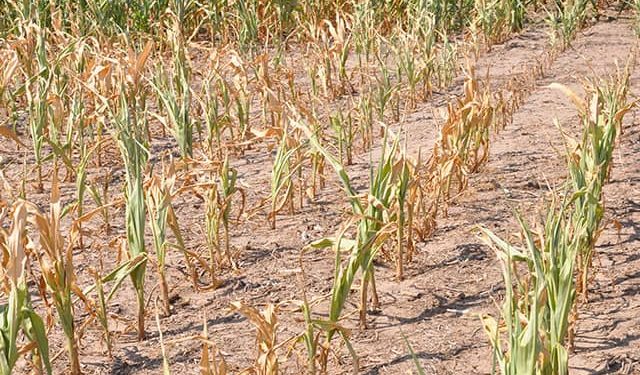Drought in northern Ghana: Govt bans grain exports, affected farmers to be compensated – Agric Minister
The ongoing dry spell has devastated key agricultural regions across Ghana, with preliminary reports indicating that nearly half of the 1.8 million hectares of farmland are already impacted.

Ghana’s agricultural sector is on the brink of a crisis as severe drought conditions endanger the livelihoods of over 928,000 farmers and jeopardize the nation’s food security.
In response, the government has launched an emergency relief package that includes a temporary ban on grain exports, cash transfers to affected farmers, and a massive grain import initiative aimed at averting a potential catastrophe.
- Advertisement -
The ongoing dry spell has devastated key agricultural regions across Ghana, with preliminary reports indicating that nearly half of the 1.8 million hectares of farmland are already impacted.
- Advertisement -
The Ministry of Food and Agriculture has estimated a staggering GHC3.5 billion loss in farmer investments, with potential revenue losses reaching GHC10.4 billion.
To prevent further damage, the government has enacted a temporary ban on the export of grains such as maize, rice, and soybean, ensuring that these critical crops remain available in the domestic market. “This ban is essential to safeguard our food supply and protect the interests of our farmers,” stated the Minister of Agriculture, Bryan Acheampong. “We must prioritize domestic needs during this crisis,” he advised.
Additionally, the government is initiating a program to mop up existing stocks from farmers to mitigate any adverse effects of this ban. Recognizing the urgent need to stabilize the food supply, the government plans to tap into the ECOWAS Grain Reserve and collaborate with the private sector to import up to 300,000 metric tons of maize and 150,000 metric tons of rice.
“We are working tirelessly to secure these imports and support our vulnerable farmers who have lost their crops,” the Minister emphasized.
Furthermore, 26,000 metric tons of poultry feed will be imported to support the poultry industry, which is also facing threats from the drought. For the affected farmers, the government will provide cash transfers amounting to GHC1,000 per hectare, targeting the most vulnerable among the 435,872 confirmed affected farmers.
- Advertisement -
“Our farmers are the backbone of our economy, and we are committed to providing them with the necessary financial assistance during this difficult time,” the Minister added.
Alongside financial support, the government is launching a replanting program that will offer fast-maturing seeds and fertilizers to farmers whose crops have failed due to the drought.
Agricultural extension officers will also be dispatched to train farmers on soil moisture conservation techniques, such as mulching and conservation tillage, to help them maximize yields under challenging conditions.
“To prevent a recurrence of this disaster, we are enhancing our collaboration with the Ghana Meteorological Agency,” the Minister said. “Through the Food System Resilience Project, we aim to provide accurate forecasts and advisories to better prepare our farmers for future climatic challenges.”
This crisis comes at a critical time, as the affected regions contribute over 62% of Ghana’s grain supply annually. With the looming threat of a significant shortfall in grain availability, the government’s swift and comprehensive intervention is crucial to averting a national food shortage and its devastating implications for food security and livelihoods.
As the government rolls out these emergency measures, the focus remains on building resilience within the agricultural sector to withstand future climatic challenges. The coming months will be critical in determining the success of these interventions and the future stability of Ghana’s food supply.
Source:onuaonline.com
- Advertisement -



